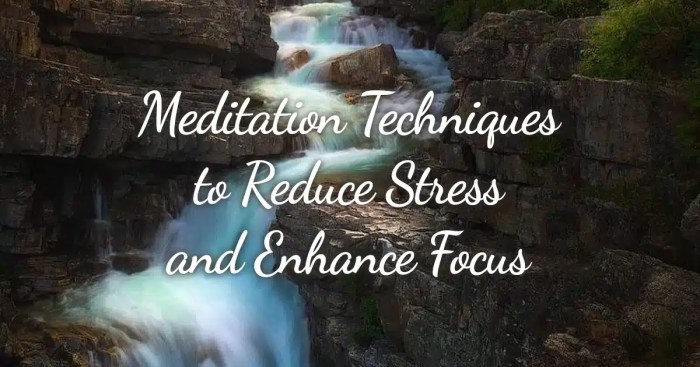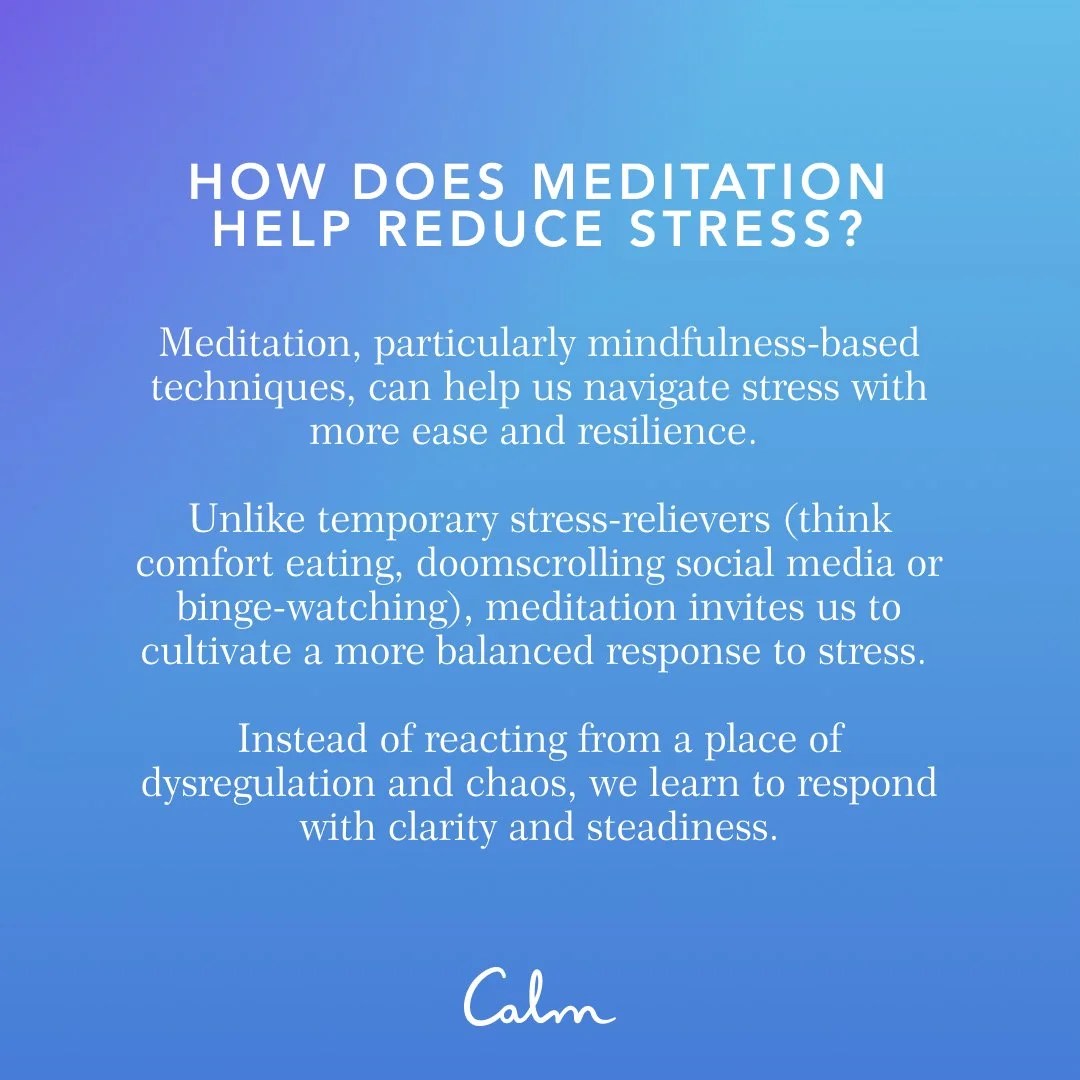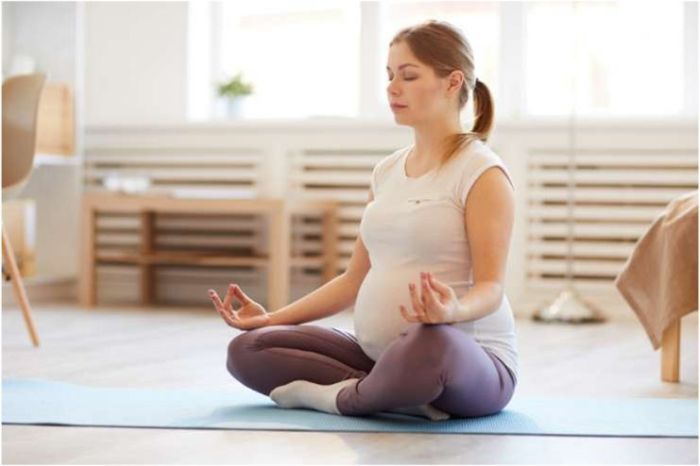7 Ways Meditation Can Reduce Stress in Your Life: Unlocking Inner Peace opens the door to a transformative journey towards a calmer, more balanced life. Dive into the realm of meditation and discover how it can revolutionize your approach to stress management.
Delve into the world of mindfulness, emotional well-being, physical health benefits, and practical tips to seamlessly integrate meditation into your daily routine. Learn how to create a serene meditation environment that nurtures your inner tranquility and enhances your stress relief practice.
Benefits of Meditation for Stress Reduction

Meditation has been proven to have numerous benefits for reducing stress, both on the body and the mind. By incorporating meditation into your daily routine, you can experience a profound sense of relaxation and calmness that can help you cope with the challenges of everyday life.
Effect on the Body and Mind
Meditation techniques such as deep breathing, mindfulness, and guided imagery can have a direct impact on the body’s stress response. When you meditate, your body releases tension, lowers blood pressure, and reduces the production of stress hormones like cortisol. This physiological response helps to promote a state of relaxation and peace in both the body and mind.
Specific Examples of Meditation Techniques
- Mindfulness meditation involves focusing on the present moment without judgment, which can help you let go of worries about the past or future.
- Deep breathing exercises can calm the nervous system and reduce anxiety, promoting a sense of tranquility and well-being.
- Guided imagery meditation allows you to visualize peaceful scenes or positive outcomes, helping to shift your focus away from stressors and towards positivity.
Scientific Evidence Supporting Meditation
Numerous studies have shown the effectiveness of meditation in reducing stress levels. Research has demonstrated that regular meditation practice can lead to changes in brain activity associated with improved emotional regulation and decreased stress reactivity. Additionally, studies have found that meditation can enhance resilience to stress and improve overall mental well-being.
Types of Meditation Techniques

When it comes to reducing stress through meditation, there are various techniques that one can practice. Each type of meditation technique offers unique benefits and approaches to calming the mind and body.
Mindfulness Meditation
- Mindfulness meditation involves focusing on the present moment and being fully aware of your thoughts and sensations without judgment.
- Practitioners often sit quietly and observe their thoughts as they come and go, helping to cultivate a sense of calm and acceptance.
- This technique is effective in reducing stress by bringing attention to the present moment and promoting a sense of relaxation.
Transcendental Meditation
- Transcendental meditation involves the use of a mantra—a word, sound, or phrase repeated silently—to focus the mind and achieve a state of relaxed awareness.
- Practitioners sit comfortably with their eyes closed and repeat the mantra, allowing thoughts to drift away and promoting a deep state of relaxation.
- This technique is known for its effectiveness in reducing stress and promoting inner peace.
Body Scan Meditation
- Body scan meditation involves systematically focusing on each part of the body, starting from the toes and moving up to the head, to bring awareness to physical sensations and release tension.
- Practitioners lie down in a comfortable position and mentally scan their body, observing any areas of tension and consciously relaxing them.
- This technique is useful for reducing physical and emotional stress by promoting relaxation and body awareness.
Loving-Kindness Meditation
- Loving-kindness meditation focuses on cultivating feelings of compassion and goodwill towards oneself and others.
- Practitioners repeat phrases or mantras that promote love, compassion, and kindness, directing these positive emotions towards themselves and others.
- This technique can help reduce stress by fostering positive emotions and increasing feelings of connection and empathy.
Mindfulness and its Role in Stress Management

When it comes to stress management, mindfulness plays a crucial role in helping individuals navigate through daily challenges and pressures. By incorporating mindfulness practices into their routine, individuals can cultivate a greater sense of awareness and presence that enables them to respond to stressors in a more balanced and calm manner.
Benefits of Mindfulness for Stress Reduction, 7 Ways Meditation Can Reduce Stress in Your Life
- Enhanced Self-awareness: Mindfulness practices help individuals become more in tune with their thoughts, emotions, and physical sensations, allowing them to identify stress triggers and patterns more effectively.
- Improved Emotional Regulation: Through mindfulness, individuals can develop the ability to observe their emotions without judgment, leading to a more measured and controlled response to stressful situations.
- Increased Resilience: By cultivating mindfulness, individuals can build resilience to stress and adversity, enabling them to bounce back more quickly and effectively from challenging circumstances.
Real-life Examples of Mindfulness in Action
- During a hectic workday, taking a few moments to practice mindfulness meditation can help an individual reset and refocus, reducing the impact of work-related stress.
- In a conflict situation, applying mindfulness techniques such as deep breathing and body scans can help individuals stay grounded and composed, facilitating a more constructive resolution.
- Before bed, engaging in a mindfulness practice like a gratitude journal can promote relaxation and better sleep, easing the burden of accumulated daily stress.
Meditation and Emotional Well-being
Meditation plays a crucial role in enhancing emotional well-being and building stress resilience. By incorporating meditation into your daily routine, you can effectively manage your emotions during challenging situations, leading to a more balanced and peaceful state of mind.
Impact of Meditation on Emotional Well-being
- Meditation helps individuals cultivate self-awareness and mindfulness, allowing them to recognize and acknowledge their emotions without judgment.
- Regular meditation practice can reduce the intensity of negative emotions such as anxiety, anger, and frustration, promoting a sense of calmness and emotional stability.
- By focusing on the present moment through meditation, individuals can prevent excessive worrying about the future or ruminating on past events, leading to improved emotional well-being.
Examples of How Meditation Regulates Emotions
- During a stressful situation, practicing deep breathing meditation can help individuals calm their mind and body, enabling them to respond to the situation with clarity and composure.
- Mindfulness meditation techniques, such as body scan meditation, can assist individuals in releasing tension and stress from different parts of their body, promoting relaxation and emotional balance.
- Loving-kindness meditation focuses on cultivating feelings of compassion and empathy towards oneself and others, fostering a positive emotional state and reducing feelings of hostility or resentment.
Personal Anecdotes on Emotional Benefits of Meditation
- After incorporating meditation into my daily routine, I noticed a significant improvement in my ability to handle stressful situations with a calm and composed demeanor, enhancing my emotional resilience.
- Through mindfulness meditation, I learned to observe my emotions without being overwhelmed by them, allowing me to respond thoughtfully rather than react impulsively in challenging circumstances.
- Practicing gratitude meditation helped me shift my focus towards positivity and appreciation, reducing feelings of anxiety and enhancing my emotional well-being overall.
Physical Health Benefits of Meditation
Meditation not only helps in reducing stress but also offers several physical health benefits that contribute to overall well-being. By incorporating regular meditation practice into your routine, you can experience improvements in various aspects of your physical health.
Impact on Conditions Exacerbated by Stress
- Meditation can have a positive impact on conditions exacerbated by stress, such as hypertension. Through the relaxation response triggered by meditation, blood pressure levels can be reduced, leading to better management of hypertension.
- Furthermore, meditation can also help in alleviating insomnia, a common condition associated with stress. By calming the mind and promoting relaxation, meditation can improve sleep quality and duration, thus addressing sleep disturbances caused by stress.
Mind-Body Connection in Meditation
- Meditation emphasizes the mind-body connection, highlighting the interplay between mental and physical well-being. By cultivating mindfulness and awareness through meditation practices, individuals can develop a deeper understanding of how their thoughts and emotions influence their physical health.
- This mind-body relationship in meditation can lead to reduced physical manifestations of stress, such as muscle tension and headaches, as individuals learn to release tension and promote relaxation through mindfulness techniques.
Integrating Meditation into Daily Routine

Incorporating meditation into your daily routine can be a powerful tool for reducing stress and promoting overall well-being. Consistency and commitment are key in establishing a meditation practice that yields benefits. Here are some practical tips and strategies to help you integrate meditation seamlessly into your busy schedule.
Making Time for Meditation
- Start your day with meditation: Set aside a few minutes in the morning to meditate before the hustle and bustle of the day begins.
- Utilize breaks: Take short meditation breaks during your workday to reset and refocus your mind.
- Combine with other activities: Pair meditation with activities you already do daily, such as brushing your teeth or taking a shower.
Creating a Sacred Space
- Designate a quiet corner: Create a dedicated space in your home where you can meditate without distractions.
- Add personal touches: Decorate your meditation space with calming elements like candles, cushions, or plants.
- Set the mood: Play soft music or use essential oils to enhance the ambiance and promote relaxation.
Overcoming Barriers
- Address time constraints: Start with short meditation sessions and gradually increase the duration as you build consistency.
- Manage distractions: Find ways to minimize interruptions during your meditation practice, such as turning off notifications or using earplugs.
- Stay motivated: Keep a meditation journal to track your progress and celebrate small achievements along the way.
Creating a Relaxing Meditation Environment

Creating a peaceful and tranquil space for meditation at home is essential for enhancing the effectiveness of your practice. The right ambiance, lighting, and decor can significantly contribute to reducing stress and promoting relaxation during meditation sessions.
Setting Up a Conducive Environment
- Choose a quiet and clutter-free area in your home where you can meditate without distractions.
- Consider using soft lighting or natural light sources to create a calming atmosphere.
- Add elements of nature, such as plants or a small indoor fountain, to bring a sense of serenity to the space.
- Use comfortable cushions or a meditation mat to support your posture and ensure physical comfort during meditation.
Enhancing Ambiance, Lighting, and Decor
- Use soothing colours like soft blues, greens, or earth tones to promote relaxation and tranquillity.
- Consider incorporating aromatherapy with essential oils or scented candles to create a calming scent in the room.
- Play soft instrumental music or nature sounds in the background to enhance the meditative experience.
- Decorate the space with meaningful objects like crystals, statues, or inspirational quotes to inspire and uplift your practice.
Epilogue: 7 Ways Meditation Can Reduce Stress In Your Life
Embark on this empowering path of self-discovery through meditation and witness the profound impact it can have on your overall well-being. Embrace the serenity within you and let meditation be your guiding light towards a stress-free life filled with inner peace and harmony.